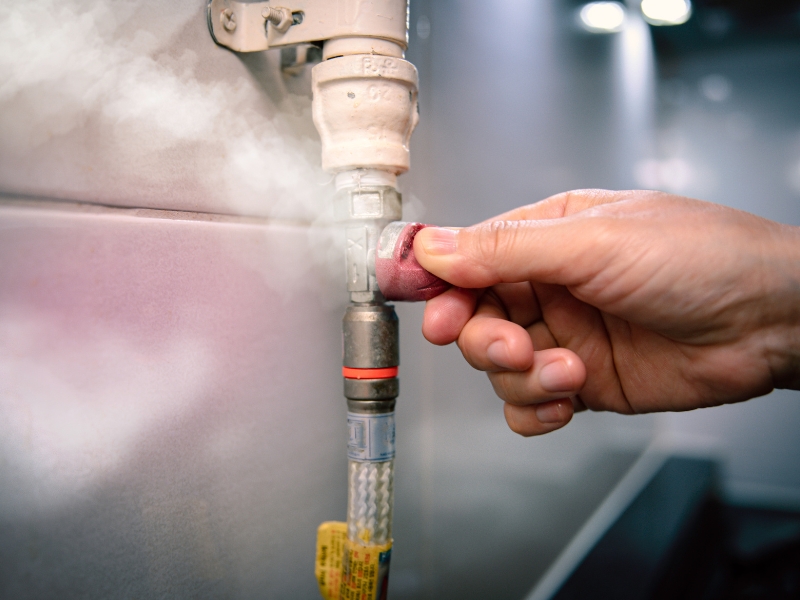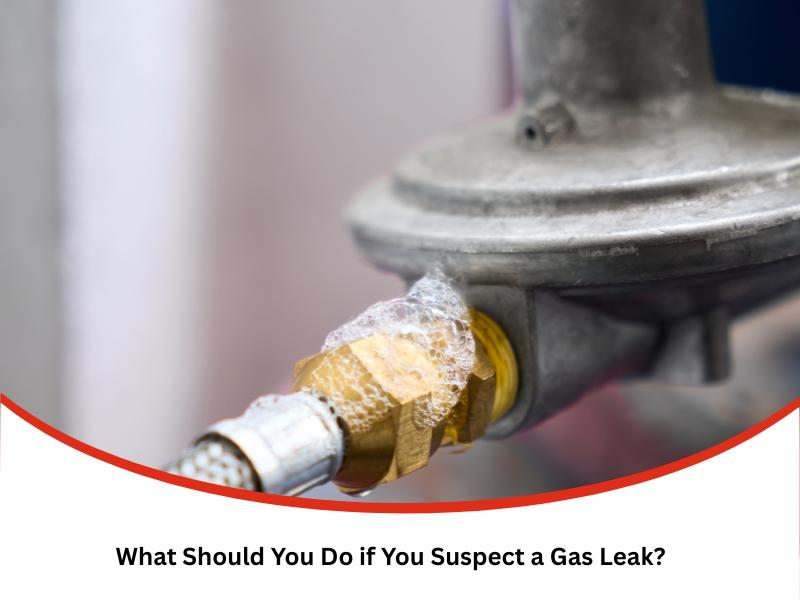Gas leaks don’t always announce themselves with drama, but when left unaddressed, they can escalate fast. Whether it’s a faint sulphur-like smell or subtle hissing from behind the wall, a suspected gas leak should never be ignored. This article explores how to identify early warning signs, understand the causes of leaks, respond promptly, and mitigate future risks. If you live in a home with gas appliances, knowing what to do in the event of an emergency could make all the difference. A prompt response isn’t just thoughtful—it’s potentially lifesaving.
How can you recognise signs of a suspected gas leak?
Even small gas leaks can pose serious risks, so recognising them early is critical. Not every leak comes with prominent warnings, but once you know what to watch for, it’s easier to respond confidently.
- Rotten egg smell – Gas providers add a strong odour to help you detect leaks fast.
- Hissing or whistling sounds – These noises near gas lines suggest escaping gas.
- Dead plants or grass – Sudden changes in vegetation can point to a leak underground.
- Headaches and nausea – Physical symptoms indoors may be caused by exposure to gas.
- Bubbling in wet areas – If water puddles seem to bubble, gas might be escaping below.
Some of these signs can be easy to miss, especially when distractions or other odours are present. Understanding the early warning signs of a gas leak in your home can help you stay ahead of a potentially dangerous situation.
Spotting these signals doesn’t require expert training—just awareness. As soon as something feels off, take it seriously.
What are the most common causes of a suspected gas leak?
Knowing what typically leads to a leak can help you stay proactive. Gas systems deteriorate over time, and without proper maintenance, minor issues can escalate into significant safety hazards.
- Worn or damaged pipes – Age, corrosion, or shifts in the ground can weaken gas lines.
- Faulty appliances – Heaters, stoves, and hot water units can all become sources if neglected.
- Improper fittings – Loose connections from DIY attempts or old installations are common culprits.
- Accidental damage – Drilling or digging without knowing line locations often ends badly.
- Poor ventilation – Inadequate airflow can let small leaks accumulate and become hazardous.
Gas is invisible and odourless in its natural state, so leaks often go unnoticed until damage is done. Taking steps to discover trusted methods for indoor gas leak detection is a simple way to improve home safety without waiting for an emergency.
Understanding the common causes also empowers you to ask better questions and seek help before something goes pear-shaped.
Why is delaying action on a suspected gas leak so risky?
It might be tempting to wait and see if the smell clears, but even short delays come with big risks. Gas doesn’t always stay put, and what starts as a minor leak can escalate quickly.
- Explosions and fire – Gas builds up fast and ignites easily with the smallest spark.
- Toxic exposure – Breathing in gas over time can lead to dizziness, nausea, or worse.
- Environmental impact – Methane leaks contribute significantly to greenhouse gas emissions.
- Property damage – Fires or structural damage from explosions can cost thousands to repair.
- Legal Consequences – Ignoring a known leak may leave you liable if someone is hurt.
Even if nothing happens right away, the longer you wait, the more pressure builds—literally. The best move? Don’t wait. Take decisive action as soon as you suspect a problem.
Stalling only gives the problem time to worsen. With gas, it’s better to be safe than sorry.
What should you do first during a suspected gas leak?
If you suspect a leak, acting fast and smart can protect your household. Here’s what to prioritise:
- Evacuate everyone – turn off all lights and appliances.
- Avoid open flames – No smoking, candles, or spark-producing items are allowed.
- Don’t use switches – Anything electrical can ignite leaking gas.
- Call from a safe spot – Once you’re outside, ring emergency services or your gas provider.
- Stay out until cleared – Don’t re-enter until professionals give the all-clear.
Keep in mind: your safety comes before any belongings. Whether the smell seems faint or overwhelming, it’s not worth the risk. You’ll respond more effectively if you already know the first steps to take if you detect a gas leak, so go over them before it’s needed.
Preparation gives you a clear head when panic might otherwise take over. A little planning now can go a long way later.

How do you safely handle a suspected gas leak at home?
Once you’re aware of a potential leak, take steps to minimise the risk of further damage. Even without visible damage, escaping gas can rapidly fill enclosed spaces.
- Ventilate if safe – Only if the leak is minor and there’s no spark risk, open windows to disperse the gas.
- Shut off the gas at the meter – Know where your valve is and how to turn it off.
- Don’t use phones indoors – Wait until you’re outside to make calls or use electronics.
- Warn others nearby – Let neighbours know so they don’t walk into danger.
- Get checked medically – Anyone with headaches, confusion, or dizziness should seek medical help.
Carbon monoxide, often associated with gas leaks, can be just as hazardous. It’s essential to understand how carbon monoxide impacts indoor air safety, particularly in homes that utilise gas appliances.
Quick thinking during a leak can prevent much bigger problems. The proper response saves lives.
What steps can prevent a leak from happening again?
Once a leak has been handled, it’s time to think ahead. Preventative measures don’t just protect you—they save time, stress, and money down the line.
- Get regular inspections – A licensed technician can spot wear and tear before it turns serious.
- Install gas and CO detectors – These devices give early warnings before symptoms appear.
- Use qualified professionals – Avoid DIY gas work; certified tradespeople do it right.
- Teach your household – Everyone should know how to respond in case of a leak.
- Document appliance service dates – Keep records to track when checks are due.
Most leaks don’t come from a single failure. Often, it’s a slow buildup of minor oversights. By staying on the front foot, you’re far less likely to deal with a repeat emergency.
Sign of Gas Leak | Possible Cause |
Rotten egg smell | Chemical additive in leaking gas |
Hissing near appliances | Faulty fittings or cracked lines |
Headaches or nausea | Prolonged gas exposure indoors |
Dead garden patches | Underground pipeline rupture |
Whistling near meter | High pressure or valve damage |
If you’re unsure where to start, begin with a safety check. That first step might prevent a much bigger incident.
Final thoughts
Suspecting a gas leak might set off alarm bells—and for good reason. The risks are real, but so are the solutions. When you know what signs to watch for and how to act, you’re in a better position to protect your home and everyone in it.
For tailored advice or help addressing concerns at home, see how Apex Gas Heater Service helps manage gas-related risks to stay informed and ready.

